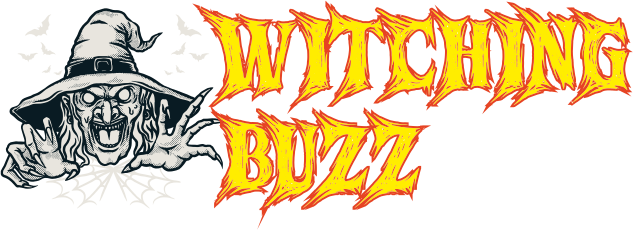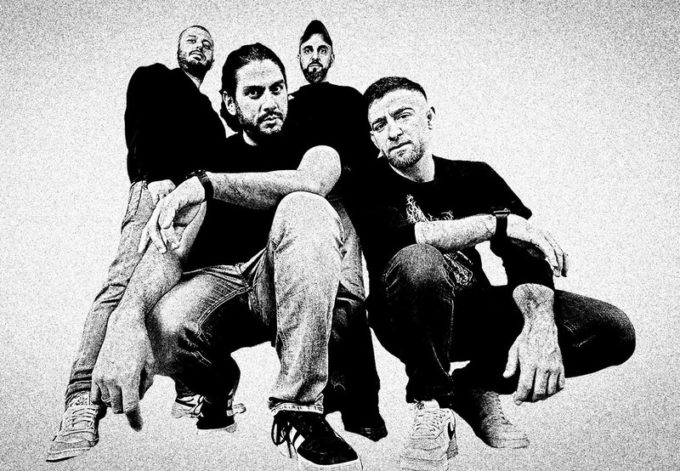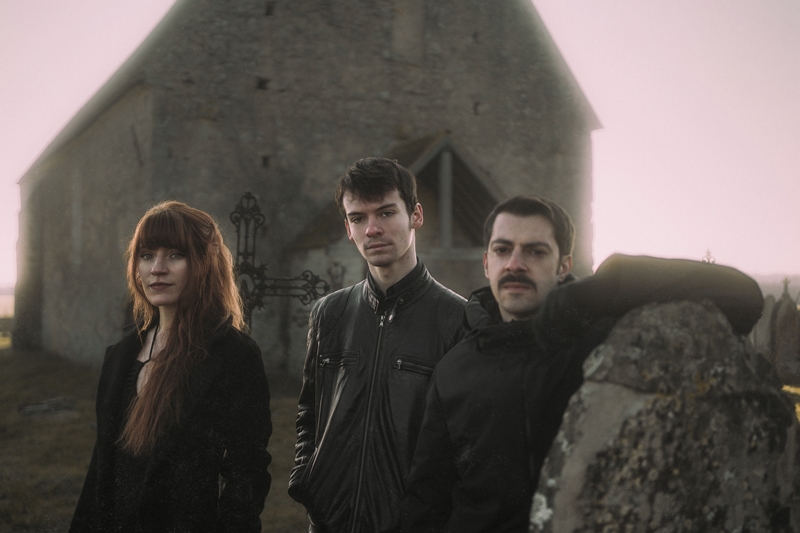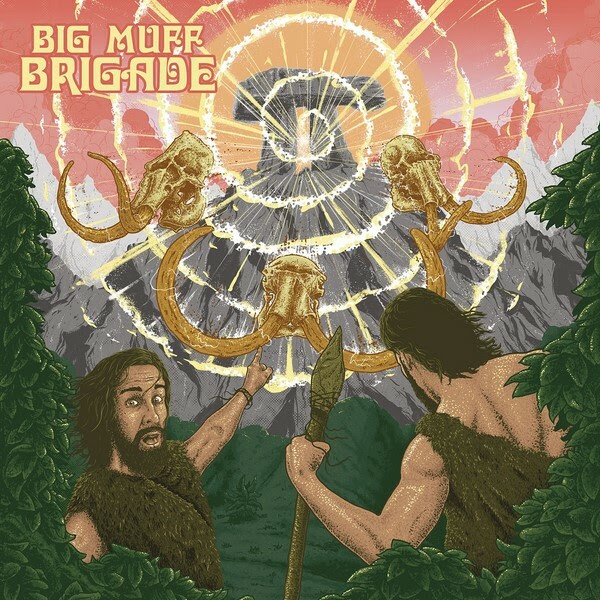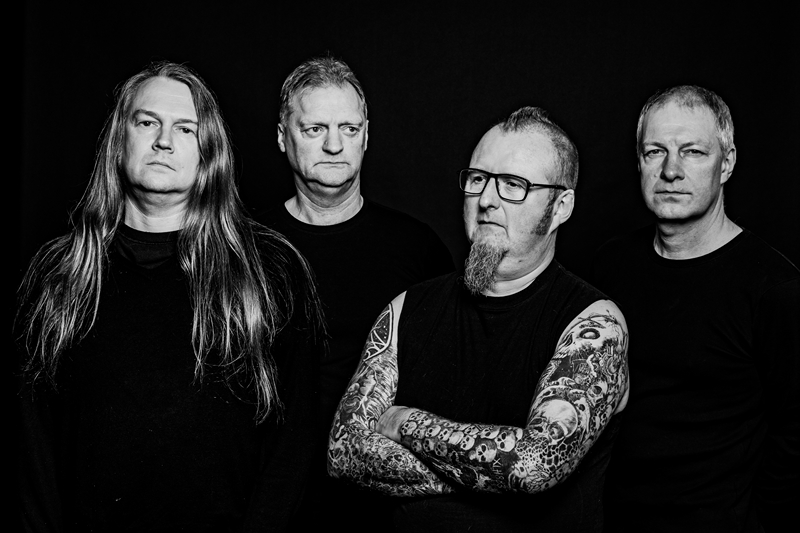Deep Valley Blues, formed in 2016 in Catanzaro by Umberto Arena, Giando Sestito, Giorgio Faini and Alessandro Morrone, debuted with their self-titled EP in 2017, blending hard rock blues, psych rock and stoner vibes. Their first full-length Demonic Sunset (2019) explored psychosis through mass culture references, followed by III – Third (2021) on Swamp Records/Sloomweep Productions. On November 29th, 2024, they released Sangue e Veleno (Blood And Poison) with Argonauta Records.
The Origin & Identity:
How did you all come together as a band, and when did it feel real?
– (Giando, Bass & Vocals): Started all in March 2016, Umberto was looking for a singer for his project, in that period I played bass & vocals with my thrash metal band Dripping Sin and Umberto contacted me. When I arrived to the rehearsal room I found Umberto, very friendly, then arrived the drummer Antonio, called “U drasticu” (drastic in south italian slang) and after a hour arrived the bass player dressed like a building manager and in fact he began by saying “I’m taking off my condominium administrator hat and putting on my rocker hat.”…let’s forget about this. I saw this man only that time, then he disappeared, and I took the bass also in this project, then the drummer left, and I and Umberto stayed to rehearse songs together with the drum recordings playing in the background for three months with little hope. In September, Giorgio joined us on the drums after a little talk, and after a month Alessandro joined as second guitar player. We arranged the songs and then we recorded our first eponymous EP live.
Where did your band name come from, and why does it feel like you?
– (Giando): Name came from the title of a song featured on the EP (that was a tribute to Uncle Acid), first Umberto wanted to entitle the band “Bounced Files”, but it wasn’t a good idea. So we checked if the name Death Valley Blues was available, but there was a group with this name with 10 listeners, and we chose the name Deep Valley Blues considering the remote place in southern Italy where we come from.
Did you have a clear vision for your sound from the start, or did it develop naturally?
– (Giando): No, it all came naturally, the first songs were composed by Umberto that has a personal style and listenings different from the rest of the group, we added only some parts and lyrics, with other songs, the development was different. Reviews of the first EP reported that we sounded like we were playing psych rock, steeped in blues and with heavy influences, categorizing us as stoner rock.
What should listeners know about your newest album?
– (Giando): It’s a liberating cry that closes a cycle and opens another one, it was released under glorious Argonauta Records, it’s our fourth work. The title is in Italian, “Sangue & Veleno” means Blood and Poison and reflects our mood in that period, because in Italian it is an expression used to indicate how angry you are. We were frustrated because after the sacrifices we didn’t see the results we hoped for.
Three songs are in Italian language: the title track, on a cursed bloodline inspired by Berserk and Do Quixote de Flamingo story in One Piece, a song that has its roots in my legacy; “Eternauta” it’s an alternate timeline in which I try to save a friend of mine who died in a car accident, but every time I manage to do so, someone else I love dies. It’s inspired by the graphic novel L’Eternauta by Hector Oesterheld and Francisco Solano Lopez, and the concept of free will and inevitable fate expressed in the Legacy of Kain series; and “Dove”, a poem by a bartender at a tourist village where I worked, whom I passed off as a great Calabrian poet. Then there is “Poltergeist,” a reference to the anxiety experienced during a certain period, seen as an ectoplasm. Italian horror film “Across the river – Oltre il guado” influenced the hard blues of “River’s Shuffle” and psych rock of “Von Hell” is inspired by the comic figure of a handyman, in the story goes mad and kills everyone who has exploited and mocked him. “Sette” is a psych rock instrumental that celebrates the seven years we have been together as a band, at the time of composition, we now almost reach ten years of activity.
Influences & Creative Process:
Who or what has shaped your sound in ways people might not expect?
– (Giando): I believe that our perseverance in wanting to offer something different, the chemistry that has developed between us, a bunch of idiots, which transcends seriousness or the desire to compose within the limits of a genre, has played a fundamental role in creating an enjoyable atmosphere, allowing us to play well and compose better.
When creating a song, do you follow a routine or mix it up each time?
– (Giando): No, there isn’t a set routine to create a song, sometimes, one brings a riff, sometimes we start a jam session that lasts for hours, and then we take the best of those and tweak the details. Sometimes the vocal line comes first, and then the song; it’s all unpredictable.
Are there moods, riffs, or ideas you find yourself returning to?
– (Giando): This state of anxiety, which I exorcise with lyrics that help me overcome those difficulties and express them, involves the theme of fear of the future. I often overcome depression and trivialize it with the exuberance of the instrumental pieces we play, which, despite being directly influenced by the blues, have a positive energy. In reality, there is much more than just blues; there is heavy metal, alternative rock, and progressive rock. Our first album was based on psychosis, a theme that recurs several times, as does that linked to the paranormal, occultism or religious sectarianism, a theme a topic that has always interested me, and on which I also based my Master’s thesis. There are also tributes to the mythologization of historical figures or scoundrels, as well as references to films, books, comics, and video games.
How do you make writing decisions — together or does someone usually lead?
– (Giando): Pure entropy, everyone can lead or not, the track will take shape naturally.
Musical Technique / Composition:
When layering sounds, do you focus more on tone or on mood?
– (Giando): Both, our songs can take life only with the combination of these elements, which vary at certain times; this is what makes it unique, because it does not follow a fixed pattern and can have different results depending on the atmosphere of the moment.
Do you use alternate tunings, odd meters, or unusual chords to shape your sound?
– (Giando): Unusual chords…mmm… it is necessary to break away from the norms, definitely we alternate composition D dropped and standard tuning.
How much of your arrangements come from improvisation versus planning?
– (Giando): Improvisation 60%, planning 40%.
Stories & Experiences:
What’s one moment that truly captures what this band is about?
– (Giando): Every live show is for the contrast between the seriousness of the music and irreverence we bring on and off stage.
Does playing live bring out a different side of your music?
– (Giando): The humanity of our music and our desire not to appear as superheroes. We often see live performances where that connection with the audience is lost. Sometimes you have to ask yourself what you are playing for, and your weaknesses, as well as what you want to give, must not be lost in the desire to appear perfect. We haven’t played on really huge stages, and there’s no need to create distance in the underground scene. There will be flaws in live performances, but why do I have to appear perfect if I’m having fun? This obviously doesn’t detract from the fact that we play to the best of our ability to express our songs.
What’s the quirkiest experiment you’ve done in the studio?
– (Giando): We always do strange things, for example, we record the bass as the last instrument. We created special sounds on the guitars to give the two guitarists different voices.
Has a fan ever done or said something that made you see your music differently?
– (Giando): There was a guy at a contest we participated in, whom I had never seen before, who stopped me at the end of our performance and said, “You can really understand what you have inside,” and I realized that the musical expression we had chosen was the right one. And that had an impact not only on a musical level but also on a personal level, opening up a positive outlook.
Current Inspirations & Recommendations:
Any up-and-coming musicians you think deserve more attention?
– (Giando): I like Colonnelli that play heavy rock with a dose of thrashy in Italian language. Cachemira Spanish psych rock band, was a nice discovery. The mix of folk and innovation created by Calabrian artist Fabio Macagnino is interesting.I also recently listened to La Niña, a Neapolitan singer-songwriter who blends pop, Neapolitan music, and electronic music. Bengala is another singer-songwriter and bassist who offers dark-tinged folk music inspired by the traditions of Brianza. He is constantly evolving, bringing different lineups to his live performances, and is currently touring theaters with an ensemble.
Vision & Reflection:
Where do you see your sound heading next? Any experiments you’re itching to try?
– (Giando): I think that our songs will be less gloomy and they will turn to something positive, we tried to use Italian language for some songs, I wanted to add our dialect but I’ve to reflect about that, because I saw difficulties to appreciate lyrics in Italian language.
Which track do you feel captures your band best, and what’s the story behind it?
– (Giando): I think that it’s “Demonic Sunset” from our first full-length, “Demonic Sunset” was born after a severe panic attack, while I was watching a bloody red sundown. As a counterpoint to the theme, live during the bridge of the solo, we shout out a line from a comedy film such as “Fantozzi” or “Fracchia e la belva umana”. With the riffing, I wanted there to be preparatory choruses during each refrain. It’s an adrenaline-fueled piece that’s difficult to categorize.
What do you hope people feel when they sink into your music?
– (Giando): I hope that energy can permeate them, that they can find themselves in our compositions, not only to get out of certain situations, but that they can find ways to solve their problems and that maybe from a situation where they are not doing very well, they can find strength.
Turbo Regime:
Fuzz or distortion?
– (Giando): Both!
Analog or digital effects?
– (Giando): What is a digital effect?
Sabbath or Zeppelin?
– (Giando): Black Sabbath with all the singers from Ozzy to Tony Martin.
Heavy riff or mind-bending solo?
– (Giando): Both
Vintage gear or modern kit?
– (Giando): And who Am I to give this answer my man?
Spotify: https://open.spotify.com/intl-it/artist/47i7pIkO72kucIh1ApadLH
Bandcamp: https://deepvalleyblues666.bandcamp.com/album/sangue-e-veleno
FB: https://www.facebook.com/deepvalleyblues
Video live: https://www.facebook.com/deepvalleyblues/videos/995552108794125
